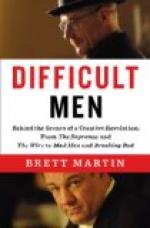Uncle Henry begged to take both children on his lap; and, holding them firmly, he made his boy push the chair here and there, got “Red” to play the once detested harmonica, and had a gay time of it all around the ranch house.
“We’d better eat indoors this afternoon,” Lucia said. “I was going to spread the table under the pergola; but it may turn cooler.”
It was not long before they were all seated at an extended table in the big living-room—that same room which had been the scene of tragedy and suffering for them, but was now so filled with joy.
“Mrs. Quinn sent over the cake,” Lucia announced, as the table-boy brought in a huge dish, on which was a chocolate cake of magnificent proportions. It looked—and was—as light as a feather; a work of art to be proud of.
“Just like her, eh?” said “Red.” “What would we do without Mrs. Quinn, the queen of ’em all!”
“That’s what I say,” Uncle Henry declared. He could hardly wait to get to the cake, for he knew what toothsome dainties the Irishwoman could cause to emerge from her oven; and often she sent him this or that sweet, “just to let ‘im know she was livin’ an’ breathin’.”
Suddenly there came a sound of hoof beats on the road; and through the open door, outlined against the flaming sunset, Gilbert could see two horsemen approaching, with pointed hats, and glistening buttons.
“Mexicans!” he cried. “What can they be doing here, now?” His mind rushed back to that terrible evening so long ago when Lopez had ridden up to the adobe, and changed the world for them all in almost the twinkling of an eye.
He got up from the table now, and “Red” followed him. Dusk was just descending, but Gilbert’s sharp eyes recognized the first horseman even in the dimming light.
“It’s Pancho Lopez!” he cried.
And sure enough, on a steed that looked like Sunday afternoon, with brand-new reins and bit, and in a suit that fit him to perfection, with gleaming spurs and shining buttons, the rakish and indomitable Pancho, his long-lost friend, returned to greet him. He could scarcely believe it. For since that memorable night when he had left them, to return to the interior of Mexico, never a word had he had from him. Meantime, the great happiness had come to him; and when the baby came into the world, he and Lucia had not forgotten the man who had been responsible for their joy. With one accord they named the boy Pancho. There was not the slightest doubt but that should be what he should be called. The only tragedy was that they had no way of letting the bandit know what they had done. Where was he? They did not know. When, if ever, would he return? They had no way of finding out. There was but one thing to do—wait. And they did. But often Gilbert had said to Lucia, “He has forgotten us, though we have never forgotten him—our friend.”
Now, in the quiet, brooding autumn dusk he came to their doorstep, dismounted, lifted his hat, smiled that wonderful smile of his, and made a bow that any courtier might have been proud to make. Behind him, on a brown horse, was Pedro, his lieutenant—the same monosyllabic Pedro, faithful unto death, and now as clean as a whistle.




